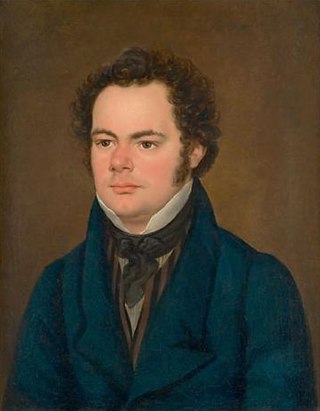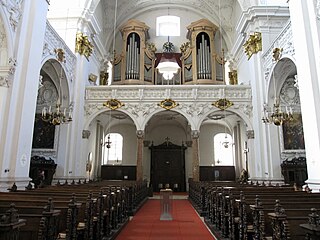The Ave Maria (Hail Mary) is a traditional Christian prayer addressing Mary, mother of Jesus.
Contents
Ave Maria may also refer to:
The Ave Maria (Hail Mary) is a traditional Christian prayer addressing Mary, mother of Jesus.
Ave Maria may also refer to:

The Hail Mary or Angelical salutation is a traditional Catholic prayer addressing Mary, the mother of Jesus. The prayer is based on two biblical passages featured in the Gospel of Luke: the Angel Gabriel's visit to Mary and Mary's subsequent visit to Elisabeth, the mother of John the Baptist. It is also called the Angelical Salutation, as the prayer is based on the Archangel Gabriel's words to Mary. The Hail Mary is a prayer of praise for and of petition to Mary, regarded as the Theotokos. Since the 16th century, the version of the prayer used in the Catholic Church closes with an appeal for her intercession. The prayer takes different forms in various traditions and has often been set to music.

"Ellens dritter Gesang", in English: "Ellen's Third Song", was composed by Franz Schubert in 1825 as part of his Op. 52, a setting of seven songs from Walter Scott's 1810 popular narrative poem The Lady of the Lake, loosely translated into German.

Inese Galante is a Latvian soprano opera singer. Galante is known for a great beauty of tone, nuanced pianissimos and sensitive command of dynamics and colour. Her performance of Vladimir Vavilov's Ave Maria, from her "Debut" album (1995) attracted worldwide interest in the piece.
"Ave Maria" is a much-recorded aria, composed by Vladimir Vavilov around 1970 and often misattributed to Renaissance composer Giulio Caccini. Vavilov himself published and recorded it in 1970 on the Melodiya label with the ascription "Anonymous". It is believed that organist Mark Shakhin, one of the performers on the "Melodiya" LP, first ascribed the work to Caccini after Vavilov's death, and gave the "newly-discovered scores" to other musicians. The organist Oleg Yanchenko then made an arrangement of the aria for a recording by Irina Arkhipova in 1987, after which the piece came to be famous worldwide.

"Ave Maria" is a popular and much-recorded setting of the Latin prayer Ave Maria, originally published in 1853 as "Méditation sur le Premier Prélude de Piano de S. Bach". The piece consists of a melody by the French Romantic composer Charles Gounod that he superimposed over an only very slightly changed version of Bach's Prelude No. 1 in C major, BWV 846, from Book I of his The Well-Tempered Clavier, 1722. The 1853 publication has French text, but it is the 1859 version with the Latin Ave Maria which became popular.

Catholic Marian music shares a trait with some other forms of Christian music in adding another emotional dimension to the process of veneration and in being used in various Marian ceremonies and feasts. Marian music is now an inherent element in many aspects of the veneration of the Blessed Virgin Mary in Catholic Mariology.
Musical tributes or homages from one composer to another can take many forms. Following are examples of the major types of tributes occurring in classical music. A particular work may fit into more than one of these types.

Ave Maria, WAB 6, is a sacred motet by Anton Bruckner, a setting of the Latin prayer Ave Maria. He composed it in Linz in 1861 and scored the short work in F major for seven unaccompanied voices. The piece, sometimes named an Offertorium, was published in Vienna in 1867. Before, Bruckner composed the same prayer in 1856 for soprano, alto, a four-part mixed choir, organ and cello, WAB 5. Later, he set the text in 1882 for a solo voice (alto) and keyboard, WAB 7.

Ave Maria, WAB 5, is a setting of the Latin prayer Ave Maria by Anton Bruckner.

Ave Maria, WAB 7, is a setting of the Latin prayer Ave Maria by Anton Bruckner.

Christus factus est, WAB 11, is a sacred motet by Anton Bruckner, his third setting of the Latin gradual Christus factus est, composed in 1884. Before, Bruckner composed in 1844 a first piece on the same text as gradual of the Messe für den Gründonnerstag, and in 1873 a motet for eight-part mixed choir, three trombones, and string instruments ad libitum. The motet is an expressive setting of the gradual, influenced by Wagner's music.

Os justi, WAB 30, is a sacred motet composed by Anton Bruckner in 1879. Os Justi is a Gregorian chant used as gradual of the Commune Doctorum, and as introit I and gradual II of the Commune Confessoris non Pontificis.

Tantum ergo, WAB 32, is the first of eight settings of the hymn Tantum ergo composed by Anton Bruckner in 1845.

Tantum ergo, WAB 42, is a setting of the hymn Tantum ergo composed by Anton Bruckner in 1846.

The Two Aequali, WAB 114 & WAB 149, were composed by Anton Bruckner in 1847.

Salvum fac populum tuum, WAB 40, is a motet composed by Anton Bruckner in 1884.

Pange lingua, WAB 33, is a sacred motet composed by Anton Bruckner in 1868. It is a setting of the Latin hymn Pange lingua for the celebration of Corpus Christi.

Inveni David, WAB 19, is a sacred motet composed by Anton Bruckner in 1868.